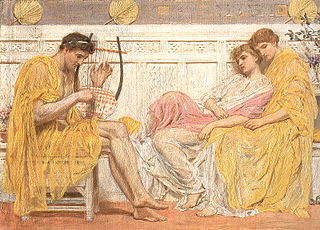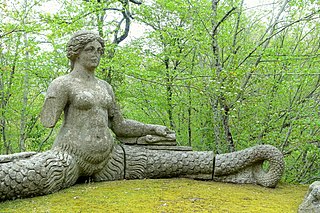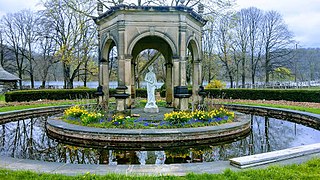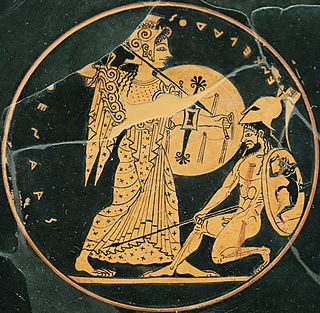Related Research Articles

Apollo or Apollon is one of the Olympian deities in classical Greek and Roman religion and Greek and Roman mythology. The national divinity of the Greeks, Apollo has been recognized as a god of archery, music and dance, truth and prophecy, healing and diseases, the Sun and light, poetry, and more. One of the most important and complex of the Greek gods, he is the son of Zeus and Leto, and the twin brother of Artemis, goddess of the hunt. Seen as the most beautiful god and the ideal of the kouros. Apollo is known in Greek-influenced Etruscan mythology as Apulu.

Aeacus was a mythological king of the island of Aegina in the Saronic Gulf. He was a son of Zeus and the nymph Aegina, and the father of the heroes Peleus and Telamon. According to legend, he was famous for his justice, and after he died he became one of the three judges in Hades alongside Minos and Rhadamanthos. In another story, he assisted Poseidon and Apollo in building the walls of Troy.
This article concerns the period 479 BC – 470 BC.

Bacchylides was a Greek lyric poet. Later Greeks included him in the canonical list of Nine Lyric Poets, which included his uncle Simonides. The elegance and polished style of his lyrics have been noted in Bacchylidean scholarship since at least Longinus. Some scholars have characterized these qualities as superficial charm. He has often been compared unfavourably with his contemporary, Pindar, as "a kind of Boccherini to Pindar's Haydn". However, the differences in their styles do not allow for easy comparison, and translator Robert Fagles has written that "to blame Bacchylides for not being Pindar is as childish a judgement as to condemn ... Marvell for missing the grandeur of Milton". His career coincided with the ascendency of dramatic styles of poetry, as embodied in the works of Aeschylus or Sophocles, and he is in fact considered one of the last poets of major significance within the more ancient tradition of purely lyric poetry. The most notable features of his lyrics are their clarity in expression and simplicity of thought, making them an ideal introduction to the study of Greek lyric poetry in general and to Pindar's verse in particular.
Asopus is the name of four different rivers in Greece and one in Turkey. In Greek mythology, it was also the name of the gods of those rivers. Zeus carried off Aegina, Asopus' daughter, and Sisyphus, who had witnessed the act, told Asopus that he could reveal the identity of the person who had abducted Aegina, but in return Asopus would have to provide a perennial fountain of water at Corinth, Sisyphus' city. Accordingly, Asopus produced a fountain at Corinth, and pursued Zeus, but had to retreat for fear of Zeus' terrible thunderbolt.
HieronI was the son of Deinomenes, the brother of Gelon and tyrant of Syracuse in Sicily from 478 to 467 BC. In succeeding Gelon, he conspired against a third brother, Polyzelos.

In Greek and Roman mythology, the Giants, also called Gigantes, were a race of great strength and aggression, though not necessarily of great size. They were known for the Gigantomachy, their battle with the Olympian gods. According to Hesiod, the Giants were the offspring of Gaia (Earth), born from the blood that fell when Uranus (Sky) was castrated by his Titan son Cronus.

In ancient Greek religion and mythology, Pan is the god of the wild, shepherds and flocks, rustic music and impromptus, and companion of the nymphs. He has the hindquarters, legs, and horns of a goat, in the same manner as a faun or satyr. With his homeland in rustic Arcadia, he is also recognized as the god of fields, groves, wooded glens, and often affiliated with sex; because of this, Pan is connected to fertility and the season of spring.

Pindar was an Ancient Greek lyric poet from Thebes. Of the canonical nine lyric poets of ancient Greece, his work is the best preserved. Quintilian wrote, "Of the nine lyric poets, Pindar is by far the greatest, in virtue of his inspired magnificence, the beauty of his thoughts and figures, the rich exuberance of his language and matter, and his rolling flood of eloquence, characteristics which, as Horace rightly held, make him inimitable." His poems can also, however, seem difficult and even peculiar. The Athenian comic playwright Eupolis once remarked that they "are already reduced to silence by the disinclination of the multitude for elegant learning". Some scholars in the modern age also found his poetry perplexing, at least until the 1896 discovery of some poems by his rival Bacchylides; comparisons of their work showed that many of Pindar's idiosyncrasies are typical of archaic genres rather than of only the poet himself. His poetry, while admired by critics, still challenges the casual reader and his work is largely unread among the general public.

The Pythian Games were one of the four Panhellenic Games of Ancient Greece. They were held in honour of Apollo at his sanctuary at Delphi every four years, two years after the Olympic Games, and between each Nemean and Isthmian Games. The Pythian Games were founded sometime in the 6th century BC. In legend they were started by Apollo after he killed Python and set up the oracle at Delphi. They continued until the 4th century AD.

In Greek mythology, Echidna was a monster, half-woman and half-snake, who lived alone in a cave. She was the mate of the fearsome monster Typhon and was the mother of many of the most famous monsters of Greek myth.

In Greek mythology, Harmonia is the immortal goddess of harmony and concord. Her Roman counterpart is Concordia. Her Greek opposite is Eris, whose Roman counterpart is Discordia.

Typhon, also Typhoeus, Typhaon or Typhos, was a monstrous serpentine giant and one of the deadliest creatures in Greek mythology. According to Hesiod, Typhon was the son of Gaia and Tartarus. However, one source has Typhon as the son of Hera alone, while another makes Typhon the offspring of Cronus. Typhon and his mate Echidna were the progenitors of many famous monsters.

In Greek mythology, Porphyrion was one of the Gigantes (Giants), who according to Hesiod, were the offspring of Gaia, born from the blood that fell when Uranus (Sky) was castrated by their son Cronus. In some other versions of the myth, the Gigantes were born of Gaia and Tartarus.

In Greek mythology, Ixion was king of the Lapiths, the most ancient tribe of Thessaly.

In Greek mythology, Enceladus was one of the Giants, the offspring of Gaia (Earth), and Uranus (Sky). Enceladus was the traditional opponent of Athena during the Gigantomachy, the war between the Giants and the gods, and was said to be buried under Mount Etna in Sicily.

In Greek mythology, Iynx was an Arcadian Oread nymph; a daughter of the god Pan and Echo. In popular myth, she used an enchantment to cast a spell on Zeus which caused him to fall in love with Io. In consequence of this, Hera metamorphosed her into the bird called iynx.

The epinikion or epinicion is a genre of occasional poetry also known in English as a victory ode. In ancient Greece, the epinikion most often took the form of a choral lyric, commissioned for and performed at the celebration of an athletic victory in the Panhellenic Games and sometimes in honor of a victory in war. Major poets in the genre are Simonides, Bacchylides, and Pindar.
In ancient Greek religion and mythology, Melia, a daughter of the Titan Oceanus, was the consort of Apollo, and the mother, by Apollo, of the Theban hero and prophet Tenerus. She was also the mother of Ismenus, god of the Theban river of the same name. Melia was an important cult figure at Thebes. She was worshipped at the Ismenion, the Temple of Apollo at Thebes, and was associated with a nearby spring.
Pindar's Eighth Nemean Ode is an ancient Greek epinikion celebrating a victory of Deinias of Aegina. The poem's exact occasion is uncertain, but a success in the diaulos race at the Nemean games is presumed to be the athletic contest in question. While its presumptive date of composition is 459 BC, the poem is known for its treatment of the Aeacidae and the suicide of Ajax.